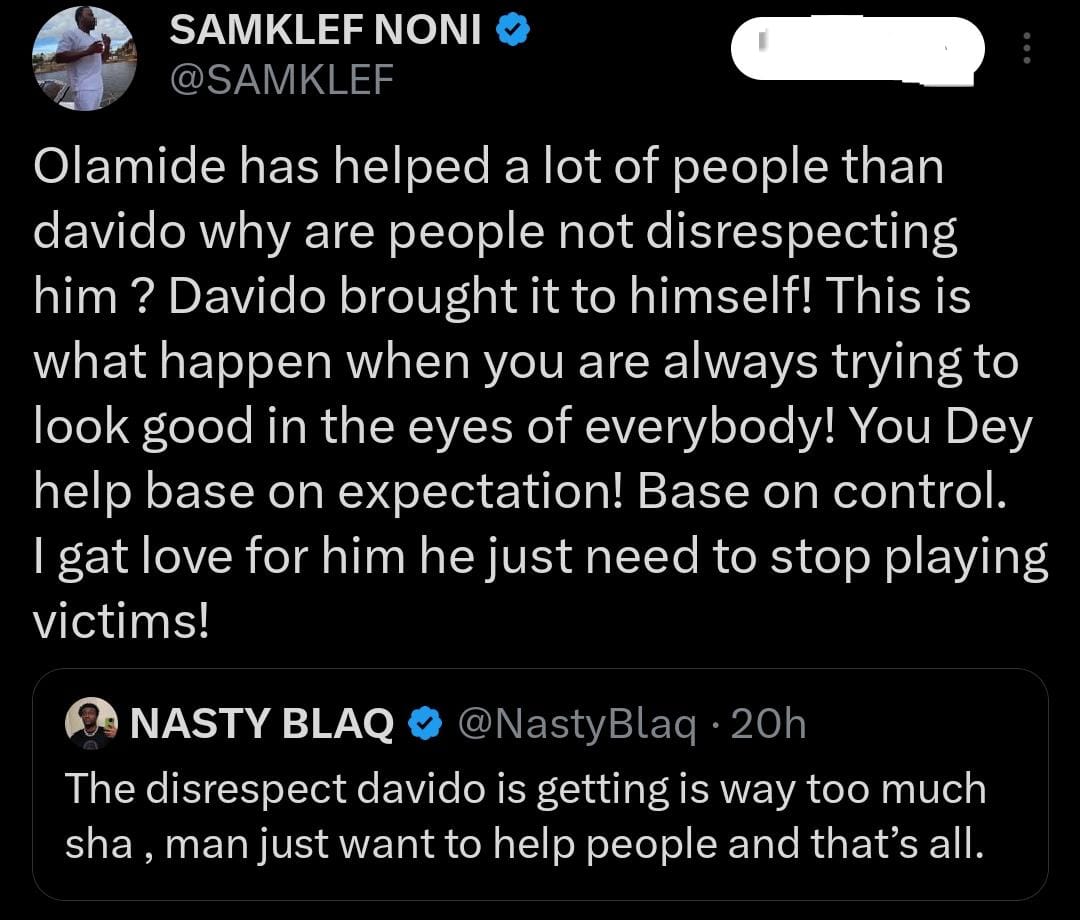A dramatic escalation of the ongoing dispute between Afrobeats superstar Davido and content creator Korty over an unreleased interview, veteran music producer Samklef has publicly urged Korty to release the contentious footage while criticizing Davido’s approach to public relations. The intervention adds a new dimension to a controversy that has already dominated social media discussions.
Taking to X (formerly Twitter), Samklef challenged the prevalent narrative surrounding Davido’s public image, particularly questioning why the artist faces more criticism than peers like Olamide, despite both being known for their philanthropic efforts. In a pointed critique, Samklef suggested that Davido’s difficulties stem from what he perceives as calculated attempts to maintain a positive public image.
The controversy began when Korty, a prominent YouTuber, revealed her frustration over being unable to release an interview with Davido, even after completing re-edits requested by the artist’s team. Her situation gained significant traction on social media, pushing the topic to the top of trending discussions and drawing both support and criticism from various quarters.
Samklef’s intervention took a particularly bold turn when he directly encouraged Korty to release the interview without approval, offering his support: “If I be korty I go release the podcast. Dem force davido do the interview? Don’t let dem bully you. Samklef go fight for you.” This statement has raised questions about the balance between artistic control and content creators’ rights.
The music executive’s criticism of Davido’s approach to public relations was particularly pointed, suggesting that the artist’s current predicament is self-inflicted. He argued that Davido’s assistance to others comes with “expectation” and “control,” contrasting this with other artists who maintain positive public relationships without facing similar levels of criticism.
Korty’s original revelation about the interview situation resonated with many content creators who have faced similar challenges with high-profile subjects. Her statement about artists who “don’t want people to see you for who you are” struck a chord in the creative community, though it also drew backlash from Davido’s supporters.
The situation highlights the complex dynamics between artists and content creators in the digital age, where control over narrative and image has become increasingly contentious. Content creators like Korty invest significant resources in producing interviews and features, while artists maintain legitimate interests in how they are presented to the public.
Samklef’s comparison between Davido and Olamide introduces an interesting perspective on how different artists manage their public personas and philanthropic efforts. His assertion that Olamide has helped more people while facing less criticism raises questions about the relationship between public perception and authentic action in the entertainment industry.
The controversy has sparked broader discussions about power dynamics in the Nigerian entertainment industry, particularly regarding the relationship between established artists and emerging content creators. Many observers note that such situations often leave content creators in difficult positions, having invested resources into projects they ultimately cannot release.
As the situation continues to unfold, it raises important questions about the future of content creation and artist collaboration in Nigeria’s entertainment landscape. The incident might prompt industry stakeholders to reconsider how such collaborations are approached, potentially leading to more formalized agreements that protect both artists’ and creators’ interests.
The public reaction to this controversy reflects the evolving nature of celebrity culture in the digital age, where authenticity and image control often come into conflict. As social media continues to blur the lines between public and private personas, such disputes may become increasingly common in the entertainment industry.
For now, the controversy remains unresolved, with Samklef’s intervention adding new fuel to an already heated discussion about artistic control, content creation, and public image in Nigeria’s entertainment industry. The outcome of this situation could set important precedents for future collaborations between artists and content creators.



